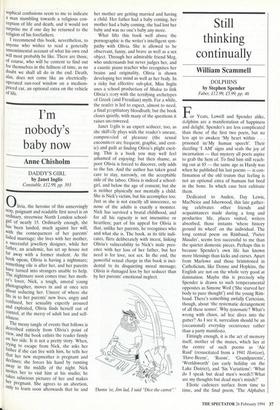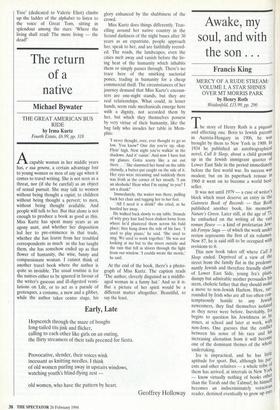Still thinking continually
William Scammell
DOLPHINS by Stephen Spender Faber, £12.99, £5.99, pp. 46 Er Yeats, Lowell and Spender alike, dolphins are a manifestation of happiness and delight. Spender's are less complicated than those of the first two poets, but no less apt to awaken 'My heart within . . . prisoned in/ My human speech'. Their dazzling 'I AM' signs and seals the joy of incarnation — that mystery all poets aspire to grab the hem of. To find him still reach- ing out at 85 — the same age as Hardy was when he published his last poems — is con- firmation of the old truism that feeling is not an optional extra of humans but bred in the bone. In which case best cultivate them.
Dedicated to Auden, Day Lewis, MacNeice and Isherwood, this late gather- ing celebrates other friends and acquaintances made during a long and productive life, places visited, writers absorbed, those instants 'where history ground its wheel' on the individual. The long central poem on Rimbaud, l'oetes Maudits', seems less successful to me than the quieter domestic pieces. Perhaps this is because Spender's own life has known more blessings than kicks and curses. Apart from Marlowe and those brimstoned in Catholicism, like Donne and Hopkins, the English are not on the whole very good at damnation. Maybe this is precisely why Spender is drawn to such temperamental opposites as Simone Well (`She starved her body to pure thought') and the young Rim- baud. There's something awfully Cartesian, though, about 'the systematic derangement of all these senses'. Why systematic? What's wrong with chaos, ad hoc dives into the gutter? As I see it, surrealism should be an (occasional) everyday occurrence rather than a party manifesto.
Fittingly enough, it is the act of memory itself, mother of the muses, which lies at the centre of such poems as 'Air Raid' (resuscitated from a 1941 Horizon), 'Have-Beens', 'Room', 'Grandparents', `Worldsworth' (an early holiday on the Lake District), and 'Six Variations': 'What do I speak but dead men's words?/ What are my thoughts but dead men's minds?'
Eliotic cadences surface from time to time, and the final poem, The Alphabet Tree' (dedicated to Valerie Eliot) climbs up the ladder of the alphabet to listen to the voice of Great Tom, sitting in splendour among the stars: 'Where the living shall read/ The more living — the dead!'



























































 Previous page
Previous page